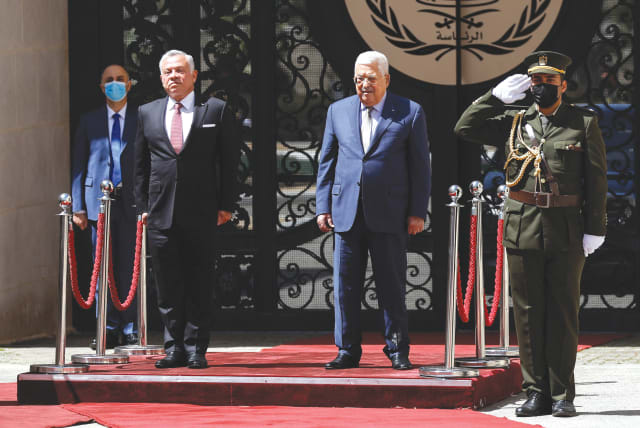A paradigm for peace: Jordan as Palestine - opinion

Recognizing Jordan as a Palestinian state, while maintaining its status as a monarchy, reflects the national identity of a majority of its population.
The two-state solution calls for the creation of a sovereign Palestinian state in all or most of what is called “the West Bank” (Judea, Samaria and eastern Jerusalem) as well as the Gaza Strip. It would be controlled by terrorist organizations, however, so promoting it is a recipe for disaster.This solution will also not solve the issue of self-determination for Palestinians and it will empower Israel’s enemies. Moreover, it makes no sense since a Palestinian state already exists: the Hashemite Kingdom of Jordan, which was created in the eastern area of British Mandate Palestine and of which two-thirds of the population consider themselves Palestinians.
A new two-state solution – Jordan/Palestine and Israel – is more viable, reasonable, practical and realistic. It would save lives and offer Palestinians the opportunity of becoming productive and constructive, instead of living under the control of despotic terrorist organizations. That is the real “two-state solution.”
This plan would not require transferring all Arab Palestinians from the West Bank to Jordan, but would offer them a choice. Those who want to live under Israeli sovereignty and abide by its laws and ethos as a Jewish state should be allowed to remain, either as citizens or residents. Those who do not and present a security threat would have to move to Jordan/Palestine, or another country. The Palestinian Authority/PLO, Hamas, and other terrorist organizations would also no longer be tolerated or accepted.
All UNRWA facilities would be closed, and international organizations would be required to accept Israeli sovereignty.
Why the Oslo Accords failed
Creating another Arab Palestinian state in the West Bank ignores the reasons why Palestinian leaders have consistently rejected it in the past. It would require four things: recognizing Israel’s right to exist; settling the issue of borders; ending terrorism, including support for terrorism; and ending demands for the “right of return” for Arabs who claim to be either refugees of the 1948-49 war, or their descendants.
Although Israel accepted the concept of Palestinian autonomy in the Oslo Accords (1993-1995), the Camp David Accords (2000), the evacuation of Jews from the Gaza Strip (2005), and agreements with the Palestinian Authority and Hamas, the Jewish state cannot be expected to jeopardize its vital security interests by empowering its enemies. Improving relations with Arab countries in the Abraham Accords has offered a regional potential for peace; that would be undermined by a new Palestinian state in the West Bank.
Hamas’s attack on October 7, the ongoing war in Gaza, and the threat of an expanding war with Iran-backed Hezbollah in the North have created a new awareness of the threats to Israel’s existence. This cannot be underestimated, or ignored.
For a while, the Oslo Accords removed the “Jordanian option” from the range of possible alternatives. Instead, Yasser Arafat, the PLO and the Palestinian Authority were installed as the rulers of what was intended to be a second Palestinian state west of the Jordan River.
The so-called “peace plan” failed, not only because of Palestinian terrorism but because of continued opposition to Israel’s existence. Moreover, Arab Palestinian terrorist organizations never intended for it to achieve peace – their goal was and still is to destroy Israel.
Rather than understand why the Oslo Accords and what became known as “the two-state solution” failed and reconsider alternatives, its architects, planners and supporters continue to cling to their fantasies. Coaxing and bribing Palestinians to make a deal always fails because that would mean ending the conflict and accepting Israel – a betrayal of what “Palestinianism” is all about.
Establishing such a second Palestinian state in the West Bank would lead to increased destabilization and increase the chances for violence between competing terrorist entities, gangs and militias, as is now the case.
How would Jordan benefit from this?
Recognizing Jordan as a Palestinian state, while maintaining its status as a monarchy, reflects the national identity of a majority of its population. Highly popular Queen Rania is considered to be a Palestinian (via her parents). Palestinians are a growing segment of Jordan’s political life and its parliament. The country east of Israel is viable with a relatively stable economic and political structure. And it has vast areas of unused land, but lacks sufficient people and water.
Jordan/Palestine can become an oasis. It needs water, which would allow it to extend its population centers eastward. Utilizing abundant water sources in Turkey and/or the Caspian Sea – the largest body of fresh water in the world – would enable it to provide agricultural products, develop business and industrial centers, and create regional stability.
Another population source to help develop its huge and basically empty eastern portion – besides its current citizens – would be those Palestinians who would either come from the West Bank voluntarily, or be sent there because, as mentioned above, they choose not to live under Israeli sovereignty or abide by its laws and ethos as a Jewish state.
This would also include any Palestinians wherever they may live, including those in Gaza, Lebanon and Syria, as well as Arab residents of Israel proper. All of them would rightfully be citizens of this newly realized Jordanian/Palestinian state: the Hashemite Kingdom of Palestine.
The possibility that Jordan could become an economic trade center was recently given a boost when Israel proposed a rail link between it and Haifa, which would connect it to European markets, Gulf States and Saudi Arabia. The recently rebuilt rail line between Haifa and Beit She’an is the beginning of this plan.
Jordan is a strategic partner of Israel and, hopefully, will continue to be. The Jordanians, however, have a responsibility to Arab Palestinians, and Israel should not be expected to bear the burden of providing them with a national homeland.
Recognizing Jordan as the Palestinian state is in the national interests of both countries. It will bring them peace and prosperity, and ensure their security and stability and the entire region. A Jordanian-Israeli confederation will replace failure and despair with opportunity and hope, and it will inspire creativity, cooperation and freedom – the raison d’être of nation-states.
The writer is a historian, and author of As Far As The Eye Can See, a collection of short stories.
Jerusalem Post Store
`; document.getElementById("linkPremium").innerHTML = cont; var divWithLink = document.getElementById("premium-link"); if (divWithLink !== null && divWithLink !== 'undefined') { divWithLink.style.border = "solid 1px #cb0f3e"; divWithLink.style.textAlign = "center"; divWithLink.style.marginBottom = "15px"; divWithLink.style.marginTop = "15px"; divWithLink.style.width = "100%"; divWithLink.style.backgroundColor = "#122952"; divWithLink.style.color = "#ffffff"; divWithLink.style.lineHeight = "1.5"; } } (function (v, i) { });

